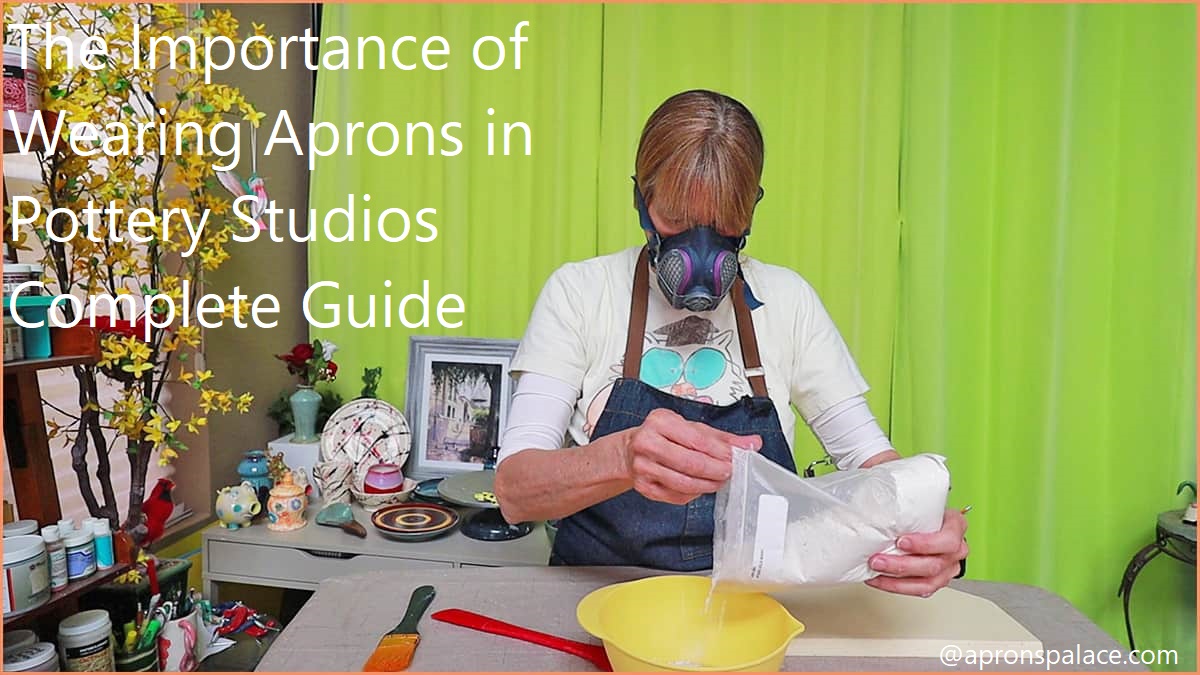As a pottery enthusiast, you might be well-versed with the importance of wearing an apron in the studio- to protect yourself from staining and other mishaps. But did you know that aprons are also essential for maintaining productivity and professional standards?
In this guide, we will discuss why it is so important to wear aprons in the pottery studio.
The use of aprons in pottery studios is often overlooked, but they can be extremely important to maintain a safe and sanitary work environment. Aprons can protect the potter from accidental slips and falls, as well as from contact with any hazardous or sharp materials. It is worth considering if your pottery studio should provide aprons for your team members when engaged in any activities.
The covering of the torso with an apron also serves other purposes beyond physical protection. For example, it is wise to wear one in order to avoid getting clay on the clothing of those nearby that might be more vulnerable to damage. Additionally, wearing an apron can help keep excess clay on the potter’s own hands and clothes contained in one place until it can be properly disposed of later. This can help reduce clean up time and make sure that no clay finds its way onto surrounding surfaces or furniture.
Finally, having a designated ‘studio’ apron for each member of your team will also foster a sense of belonging and contribute positively to their identity within the workspace setting. This can positively affect morale and create an atmosphere that encourages creativity for quality ceramicware production outcomes.
Explanation of the topic
Pottery is an art form that rewards patience and skill, but taking safety precautions in the workshop can make all the difference. Wearing an apron while creating pottery is essential to protecting yourself from clay and glaze that may splatter while trimming or throwing. An apron can also help keep your clothes from becoming dangerously hot or stained during firing.
When searching for an apron, look for breathable material such as 100% cotton or natural linen that’s easy on the skin, durable enough to handle heavy duty work, and free of any chemicals that could transfer onto your work. You should also consider your arm movements—especially when wheel-throwing large pieces—and make sure you choose an apron with straps long enough to accommodate full range of motion with ease and comfort.
Another important factor when selecting an apron is overall length. Too short and you might find yourself with clay clinging to your knees; too long and you may feel weighed down while at the wheel. We suggest trying on different models before purchasing one so you can determine which fits best based on personal preference.

Purpose of the article
This article aims to provide a comprehensive look at the importance of wearing aprons when working in a pottery studio. It covers topics such as safety precautions, potential hazards, and personal hygiene.
The article also discusses how to choose the right type of apron for your needs and which features may be beneficial for you. Finally, this article will go into detail about how to properly care for your apron so that it lasts for years and shows off your personal style.
By reading this article, you’ll gain knowledge regarding why wearing an apron is important when working in any type of pottery studio.
Brief overview of the article
This article provides a comprehensive guide to the importance of wearing aprons in pottery studios. It highlights the value of wearing aprons in order to prevent injuries, possible damage to clothing due to clay and chemicals, as well as how it can help to keep a clean work environment.
The article covers the types of aprons available and steps one can take in order to ensure they are properly fitted and safety measures that should be considered when using different tools and equipment. Lastly, it shares insight on how proper care is important for making sure an apron lasts a long time while providing maximum protection.
Benefits of wearing aprons in pottery studios
Aprons play an important role in the overall safety of pottery studios. They protect potters from the dust, dirt and splatters often found in a busy studio. Wearing an apron can also shield you from hot kiln openings and flying shards of clay. Not to mention, it can provide comfort as you lean over a wheel or table – preventing any unnecessary stress to your neck or back.
Besides taking care of your body, aprons can avoid throwing off the balance of your workspace by keeping tools and supplies at hand. Many aprons have pockets and loops that make storing materials quick and easy while allowing for fast access when needed. They can also be decorated with accents like paint, ink stained fabric or yarn to match each unique personality and workshop aesthetic.
Apart from protecting your clothing as well as body, aprons also help in keeping supplies clean and protected which is essential for everyday pottery practices. Additionally, they can act as conversation starters or even create new connections when outside visitors arrive at the workshop – making for a more welcoming atmosphere for those who enter your laboratory of creativity!
Protection from clay and glaze splatters
Using an apron in the pottery studio can protect your clothes from clay and glaze splatters. Clay is a fine, dust-like material that can get everywhere with even the slightest breeze or movement. Glazes can cause staining, and contain lead and other chemicals that may damage skin or clothing.
Some apron manufacturers use waterproof, tough synthetic materials to make sure you stay dry throughout your pottery session. Also, organic cotton is naturally absorbent while wicking moisture away from the body – meaning it stays cool during active creating sessions in hot studios.
Wearing an apron ensures your appearance remains presentable on every creating occasion!
Keeping clothing clean
When working in pottery studios, it is important to ensure that you dress appropriately and wear an apron in order to keep your clothing clean and avoid damaging or staining your clothes. Aprons are made of a thicker material than regular clothing and serve as a protective garment, helping to prevent clay and other materials from coming into contact with your clothing.
Additionally, when wearing an apron during pottery making, you can also store essential tools such as scissors, blades, wire cutters, sponges and gloves close at hand while keeping your hands free. Simply tuck these items in the pockets or loops of the apron which are typically designed for this purpose.
Furthermore, when selecting an apron for use inside the studio you will want to select one that is easy to maintain, comfortable to wear for extended periods and is made of durable fabric that will not hinder your movements or activities. In addition, color selection should be considered when choosing the right type of protection for your clothing since light-colored aprons are better suited for covering lighter shades of apparel.
Preventing skin irritation
When working with clay or other materials in a pottery studio, it is important to wear protective garments such as aprons. Aprons can help protect the wearer from skin irritation or even more serious injuries by acting as a physical barrier between the user and the materials they’re working with. Aprons also provide additional protection such as pockets for tools and durability to withstand abrasive contact.
The main benefit of an apron is skin protection — whether you are rolling out coils, shaping pottery items on a wheel, or otherwise coming into contact with clay, an art apron will be invaluable when it comes to protecting your skin from dirt, dust and other problem materials that may be airborne or on your hands. Clay is particularly unforgiving when it comes to skin irritation because it cannot simply be rinsed off—any moisture can also cause clay to become sticky and difficult to work with. So wearing something that will provide ample coverage from neck to knee can help ensure you don’t experience any uncomfortable rashes or dryness afterwards.
Moreover, certain types of art aprons are specifically designed to repel dust, while others can help protect you from splashes of hardening chemicals such as glazes used in ceramic sculpture and molding processes. If you plan on using any of these materials during your pottery sessions, wearing an apron will not only provide peace of mind but also increase productivity—you’ll be able finish projects faster without having to stop due various irritations affecting your hands or arms!

Maintaining good hygiene
One of the primary reasons for wearing aprons in pottery studios is to maintain good hygiene. You will be working with clay and other materials that can easily get spilt when working with wet clay. Additionally, you may use glazing agents or other powdered material that can be a hazard if inhaled or ingested.
Wearing an apron helps reduce your risk of potential exposure to hazardous materials by keeping any mess confined to the apron and preventing it from getting on your skin or clothing. It also serves as a protective shield between you and the work-piece, protecting you from sharp edges and hot surfaces. Finally, aprons help ensure that clean hands are used at all times by discouraging touching of your face or putting hands in pockets while working.
Maintenance and care of aprons
The importance of wearing aprons in pottery studios cannot be overstated. Quality aprons can protect both the user and the tools and equipment they are using from serious harm, while also providing a layer of comfort. To get the most out of your apron, it is important that you take the time to properly maintain and care for it to ensure that it lasts for years to come.
To begin with, avoid washing your apron in hot water as this can cause shrinkage and damage to fabric patterns. Avoid using bleach or whitening agents as these can discolor fabrics or wear away at waterproof lining materials. If possible, washing your apron by hand is preferred as this will preserve its shape more effectively than machine washing.
In terms of drying your apron, never dry in direct sunlight or use heat as this can cause it to become misshapen, stiffer or weaker over time. The best way to dry an apron is by air-drying either indoors or outside on a line if there is no wind present that may damage wet material fibers. If you must put the item in the machine, set it on gentle cycle with cold water and hang dry after washing when able; this will help keep the fibers intact without breaking them down too much over time.
Another aspect of maintenance requires periodic inspection for any pinning, stitching or seams coming loose; any such problems should be addressed right away as they could lead to worsening issues down the road if neglected. Additionally paying attention and making repairs when needed protect against accidents such as snags from metal edges which could cut through fabric layers if not promptly handled correctly when spotted! Lastly inspect pockets regularly at least every other wash cycle – ensuring drawstrings stay closed and secured when pulled tight- which will help lengthen lifetime lifespan further prolonging protective capabilities from wear-and-tear damages caused by everyday use!
Washing and cleaning
It is essential to keep a pottery studio clean while working, as dust or dirt left on the equipments can quickly grab hold of moisture and contaminate your clay. Washing and cleaning aprons are the perfect answer for keeping the mess away from your clothing, apron also helps in minimizing contact with glaze ingredients that may harm skin.
Aprons offer protection against dust, dirt, and particles in the air, ensure that everything you wear underneath stays clean. A coarse brush used to scrub off excess residue from pottery objects should also be used in conjunction with aprons for better results.
It is recommended to have separate aprons for different stages of firing process like glazing, high fire etc.
Storage
When finished using an apron for pottery studio activities, it should be stored in a dry place away from any cold or hot components. This helps prevent any bacteria buildup as moisture can cause mold to form on the fabric. The storage container itself should be treated with protection to prevent pests from infesting the apron.
Additionally, make sure that aprons are washed before and after use to maintain cleanliness. Ultrasonic cleaners are recommended for cleaning pottery studio aprons as it removes even microscopic particles from surfaces.
Replacing worn-out aprons
If your apron is becoming worn, stained, or torn, it is important to replace it in order to ensure the safety of yourself and those around you. Aprons that are not in good condition can be easily caught on jagged pottery edges, or will not protect you if something hot or sharp comes into contact with you.
When looking for a replacement apron, make sure to choose one specifically intended for pottery studios and not residential kitchens. Crockery aprons typically have longer and wider bodies in order to provide more protection as well as multiple pockets suited to the needs of potters and ceramicists. Professionally tailored aprons made of sturdy materials like thick cotton twill or cotton drill can also ensure extra reinforcement against wear and tear.
Look for an apron with adjustable straps so that it will fit securely around your body; this will help prevent any accidents from occurring due to an ill-fitting garment slipping off of your body during strenuous activities such as throwing clay on a wheel. Lastly, make sure it matches the colour scheme of your workspace for unified flair!

Conclusion
In conclusion, wearing an apron while working in a pottery studio is essential for safety and cleanliness. It helps protect against accidental splattering of clay and glazes which can permanently stain clothing. An apron will also provide protection from the heat generated by firing kilns. Finally, it offers an overall sense of tidiness while working with clay – making an already messy process much easier to manage.
By employing these tips, you can ensure that your studio experience is safe, efficient, and enjoyable.
FAQ’s
Do you need an apron for pottery?
Yes, wearing an apron is recommended while working with pottery to protect your clothing from getting dirty or stained.
What do you wear to a pottery studio?
It is recommended to wear comfortable and casual clothing that you don’t mind getting dirty. Avoid wearing loose clothing, jewelry or accessories that can get caught in the machinery.
What kind of apron to use for pottery?
A full-body apron made of sturdy material, such as canvas or denim, is recommended for pottery as it provides better protection from clay and glaze splatters.
Should I wear a mask when working with clay?
Yes, wearing a mask is recommended when working with clay, as it can produce fine dust particles that can be harmful if inhaled.
How important is a clay mask?
A clay mask is essential for protecting the lungs from inhaling harmful dust particles that can cause respiratory issues over time.
What is the health and safety for working with clay?
Working with clay involves risks to health and safety, such as inhaling dust, exposure to chemicals, and physical hazards. Therefore, it is crucial to follow proper safety measures and guidelines to minimize these risks.
What is the health risk in pottery?
The health risks in pottery include respiratory problems from inhaling clay dust, exposure to harmful chemicals, and physical hazards like cuts, burns, and electrical shocks.
What are the hazards to safety pottery?
The hazards to safety in pottery include exposure to chemicals, inhaling dust, physical hazards such as cuts and burns, and machinery-related accidents.
How can we keep our studio safe and clean while handling clay?
We can keep our studio safe and clean while handling clay by following proper safety guidelines, wearing protective equipment, cleaning up spills and messes immediately, and properly disposing of hazardous materials.
What are the safety rules for ceramics?
The safety rules for ceramics include wearing protective equipment, following proper handling and storage procedures for chemicals, avoiding inhaling dust, and properly using and maintaining machinery and equipment.
See more:
- Best aprons for pottery 2023
- Best aprons for women 2023
- Best aprons 2023
- Best radiation aprons 2023
- Best waitress aprons 2023

Douglas Keefer is the CEO and author of apronspalace.com and Informative Website. With his extensive knowledge and expertise in the world of aprons, he has helped thousands of people find the perfect apron for their needs. Douglas’s commitment to transparency and honesty has made apronspalace.com stand out in a sea of biased reviews and sponsored content. He is a true pioneer in the world of aprons and a passionate advocate for the culinary arts

